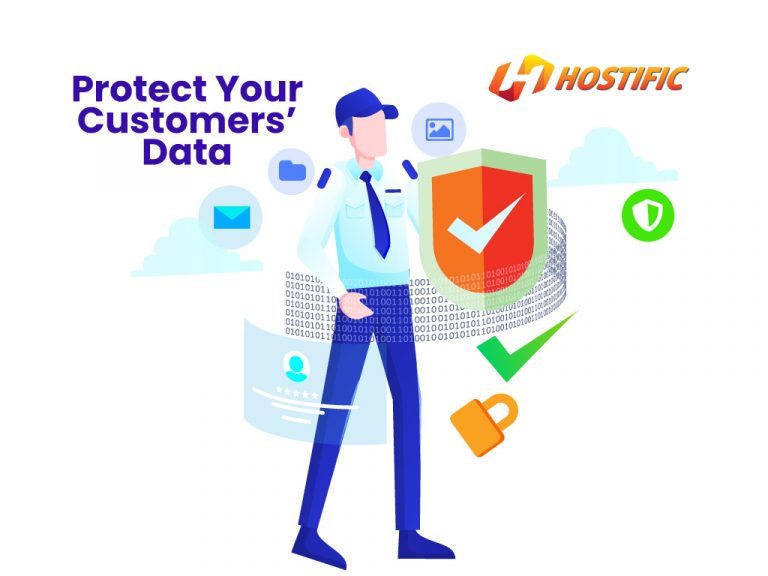Every day customers trust you and your company with sensitive personal information such as their full name, identification number, address and credit card credentials. It is your job to ensure this type of information is secure from hackers and cybercriminals. Taking steps to secure your customers’ data is not just for their security but yours as well. When customers lose trust in your business, it not only decreases your potential revenue but also can cost you your company’s reputation.
We have put together a few measures to help you secure both your customer data and your company’s reputation.
Table of Contents
1. You are a Target for information theft
Let that marinate just a little. Even as the operator of a small business, you are a target for cybercriminals. Denying that you are, create an even greater problem. Your complacency makes you vulnerable.
Small businesses are more likely to be attacked and suffer from security breach for this very reason. Because most small businesses have less resources than their bigger counterparts and so have less data protection mechanisms in place.
2. Use a web host that offers the most security
Web hosts are a dime a dozen these days, but they are not all equals.
Many businesses opt for shared hosting services, which is the cheapest of the lot. The downside is that your website is essentially sharing the same space with many other websites. It is just like sharing a room with your messier younger sibling. Even if you keep your bed clean, their things always end up on your side of the room. Also, if their friends come over they are also in your space. Sharing a server leaves your website vulnerable as a hacker can access your account through another site you share a server with. Sure your webhost will use software to help protect you but it may not be enough.
Opt for a site with a higher level of data security.
A virtual private server (VPS) is not a bad option. Though the server is shared, VPS creates a barrier that separates your website from the others. Using a VPS will cost a bit more than shared hosting. But this is a small price to pay for your customers’ data security.
There is yet another alternative. You can bypass both shared hosting and VPS and instead open a private server account for your website. This way you maintained your data on a separate server, all by itself. Private servers will clearly cost you a pretty penny but if offers the most security.
3. Consistently upgrade and update your security software
Your customer data is a prime asset and you can never be too careful in protecting it. You may have bought and installed the best anti-hacker software available but even that isn’t enough. Hackers are smart and are always coming up with new ways to tamper with websites. That is why software providers are always creating updates. So should you. As soon as an upgrade becomes available, be sure to update your security software.
4. Install several layers of protection
Can you really install too much protection? No, you cannot. There are many types of cybercriminals looking for easy targets. Make it difficult and near impossible for hackers to access your information. Do this by installing multiple layers of firewalls and anti-virus security software.
Also, install website monitoring tools to alert you of an attack or suspicious activities.
5. Generate and Maintain Strong Passwords for your website and software
It’s strange that companies will purchase expensive security software and yet have the weakest passwords. Your password is the gateway to your website. You get to choose- white picket fences or a strong fort.
Use the services of a password generator to check the strength of your password. Create and maintain strong passwords to keep your company and customers’ data protected.
6. Limited Access to Customer Information
Customer information should be on a need to know basis. The truth is that not everyone in your organization needs access to your customers’ personal information.
The fewer the better. It also reduces the number of weak points and vulnerability that hackers seek out and use to their advantage.
7. Keep Testing For Vulnerabilities
Never stop looking for vulnerabilities in your system because cybercriminals are searching for them as well. It is reckless to believe that having a strong password, updated security software and a private server is enough. Never get complacent. You have to test your security systems for weaknesses and fix them before a hacker finds them.
No system is perfect and it’s your job to do routine checks and updates. You can even look into hiring cybersecurity experts to help you identify these vulnerabilities.
8. Get Professional Help
You may be business-savvy but not so much in the information technology (IT) sector. Don’t worry, there are professionals for that. Hire one.
You can go about working on other areas of your business while a trained IT security professional monitors your website. They will know exactly what to look for. Surely this will come at a cost. However, you’ll be able to sleep better knowing that your server, software and business activities are being monitored daily.
This person’s job is to update and install security measures to ensure both the information for the company and customers remain safe.
9. Collect basic date and verify instead of storing
Ask for only the information you need to conduct business with your customer. Information such as names and addresses are good for business purposes. However, there is no need to store a customer’s credit card details. Simply verify it or have this information handled by a third party equipped to do so.
10. Be transparent
It is bad enough that your customer data may have been tampered with; don’t make matters worse by keeping it hushed.
Notify your customers immediately if your server has been attacked and data has been stolen. Many times, customers are able to take the necessary steps to protect themselves, like contacting their banks and changing passwords.
Transparency helps not just your customers but your company’s reputation.
Remember that your customers’ data is an asset, one that you should put measures in place to protect.






